What is the least number of solid metallic spheres, each of 6 cm diameter, that should be melted and recast to form a solid metal cone whose height is 45 cm and diameter is 12 cm?
Let the number of solid metallic spheres be 'n'
Volume of 1 sphere
![]()
Volume of metallic cone
= ![]()

The least number of spheres needed to form the cone is 15
A largest sphere is to be carved out of a right circular cylinder of radius 7 cm and height 14 cm. Find the volume of the sphere. (Answer correct to the nearest integer)
Radius of largest sphere that can be formed inside the cylinder should be equal to the radius of the cylinder.
Radius of the largest sphere = 7 cm
Volume of sphere

A right circular cylinder having diameter 12 cm and height 15 cm is full of ice-cream. The ice-cream is to be filled in identical cones of height 12 cm and diameter 6 cm having a hemi-spherical shape on the top. Find the number of cones required.
Let the number of cones be 'n'.
Volume of the cylinder = ![]()
Volume of ice-cream cone = Volume of cone + Volume of hemisphere


Hence, number of cones required = 10
A solid is in the form of a cone standing on a hemisphere with both their radii being equal to 8 cm and the height of cone is equal to its radius. Find in terms of ![]() , the volume of the solid.
, the volume of the solid.
Volume of the solid

The diameter of a sphere is 6 cm. It is melted and drawn into a wire of diameter 0.2 cm. Find the length of wire.
Diameter of a sphere = 6 cm
Radius = 3 cm
![]()
Diameter of cylindrical wire = 0.2 cm
Therefore, radius of wire = ![]()
Let length of wire = h
![]()
From (i) and (ii)

Hence, length of the wire = 36 m
Determine the ratio of the volume of a cube to that of a sphere which will exactly fit inside the cube.
Let edge of the cube = a
volume of the cube = ![]()
The sphere, which exactly fits in the cube, has radius = ![]()
Therefore, volume of sphere = ![]()
Volume of cube : volume of sphere

An iron pole consisting of a cylindrical portion 110 cm high and of base diameter 12 cm is surmounted by a cone 9 cm high. Find the mass of the pole, given that 1 cm3 of iron has 8 gm of mass (approx). ![]()
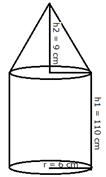
Radius of the base of poles (r) = 6 cm
Height of the cylindrical part (h1) = 110 cm
Height of the conical part (h2) = 9 cm
Total volume of the iron pole = ![]()

Weight of 1 cm3 = 8 gm
Therefore, total weight = 12780 ![]() 8 = 102240 gm = 102.24 kg
8 = 102240 gm = 102.24 kg
In the following diagram a rectangular platform with a semicircular end on one side is 22 meters long from one end to the other end. If the length of the half circumference is 11 meters, find the cost of constructing the platform, 1.5 meters high at the rate of Rs 4 per cubic meters.
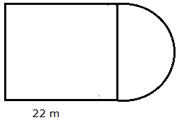
Length of the platform = 22 m
Circumference of semicircle = 11 m
![]()
Therefore, breadth of the rectangular part = ![]()
And length = ![]()
Now area of platform = ![]()

Height of the platform = 1.5 m
![]()
Rate of construction = Rs 4 per m3
Total expenditure = Rs 4 ![]() 223.125 = Rs 892.50
223.125 = Rs 892.50
The cross-section of a tunnel is a square of side 7 m surmounted by a semicircle as shown in the following figure.
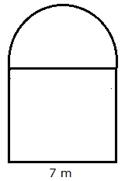
The tunnel is 80 m long. Calculate:
(i) its volume
(ii) the surface area of the tunnel (excluding the floor) and
(iii) its floor area
Side of square = 7 m
Radius of semicircle = ![]()
Length of the tunnel = 80 m
Area of cross section of the front part = ![]()

(i) Therefore, volume of the tunnel = area x length

(ii) Circumference of the front of tunnel

Therefore, surface area of the inner part of the tunnel
= 25 ![]() 80
80
= 2000 m2
(iii) Area of floor = l ![]() b = 7
b = 7 ![]() 80 = 560 m2
80 = 560 m2
A cylindrical water tank of diameter 2.8m and height 4.2m is being fed by a pipe of diameter 7 cm through which water flows at the rate of 4m/s. Calculate, in minutes, the time it takes to fill the tank.
Diameter of cylindrical tank = 2.8 m
Therefore, radius = 1.4 m
Height = 4.2 m
Volume of water filled in it = ![]()

Diameter of pipe = 7 cm
Therefore, radius (r) = ![]()
Let length of water in the pipe = h1

From (i) and (ii)

Therefore, time taken at the speed of 4 m per second
![]()
Water flows, at 9 km per hour, through a cylindrical pipe of cross-sectional area 25 cm2. If this water is collected into a rectangular cistern of dimensions 7.5m by 5m by 4 m; calculate the rise in level in the cistern in 1 hour 15 minutes.
Rate of flow of water = 9 km/hr
Water flow in 1 hour 15 minutes
i.e. in ![]()
Area of cross-section = ![]()
Therefore, volume of water![]()
Dimensions of water tank = 7.5m ![]() 5m
5m ![]() 4m
4m
Area of tank = l ![]() b = 7.5
b = 7.5 ![]() 5 = 37.5 m2
5 = 37.5 m2
Let h be the height of water then,
37.5 ![]() h = 28.125
h = 28.125
![]()
The given figure shows the cross-section of a cone, a cylinder and a hemisphere all with the same diameter 10 cm and the other dimensions are as shown. Calculate:
(i) the total surface area
(ii) the total volume of the solid
(iii) the density of the material if its total weight is 1.7 kg
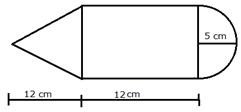
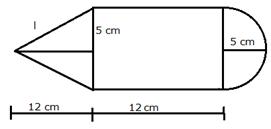
Diameter = 10 cm
Therefore, radius (r) = 5 cm
Height of the cone (h) = 12 cm
Height of the cylinder = 12 cm
![]()
(i) Total surface area of the solid

(ii) Total volume of the solid

(iii) Total weight of the solid = 1.7 kg

A solid, consisting of a right circular cone, standing on a hemisphere, is placed upright, in a right circular cylinder, full of water, and touches the bottom. Find the volume of water left in the cylinder, having given that the radius of the cylinder is 3 cm and its height is 6 cm; the radius of the hemisphere is 2 cm and the height of the cone is 4 cm. Give your answer to the nearest cubic centimeter.
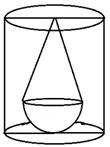
Radius of cylinder = 3 cm
Height of cylinder = 6 cm
Radius of hemisphere = 2 cm
Height of cone = 4 cm
Volume of water in the cylinder when it is full =
![]()
Volume of water displaced = volume of cone + volume of
hemisphere

Therefore, volume of water which is left

A metal container in the form of a cylinder is surmounted by a hemisphere of the same radius. The internal height of the cylinder is 7 m and the internal radius is 3.5 m. Calculate:
(i) the total area of the internal surface, excluding the base;
(ii) the internal volume of the container in m3.
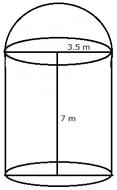
Radius of the cylinder = 3.5 m
Height = 7 m
(i) Total surface area of container excluding the base = Curved
surface area of the cylinder + area of hemisphere

(ii) Volume of the container = ![]()

An exhibition tent is in the form of a cylinder surmounted by a cone. The height of the tent above the ground is 85 m and the height of the cylindrical part is 50 m. If the diameter of the base is 168 m, find the quantity of canvas required to make the tent. Allow 20% extra for fold and for stitching. Give your answer to nearest m2.
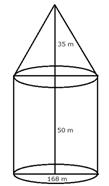
Total height of the tent = 85 m
Diameter of the base = 168 m
Therefore, radius (r) = 84 m
Height of the cylindrical part = 50 m
Then height of the conical part = (85 - 50) = 35 m
Slant height (l) ![]()
Total surface area of the tent = ![]()
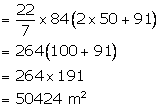
Since 20% extra is needed for folds and stitching,
total area of canvas needed

A test tube consists of a hemisphere and a cylinder of the same radius. The volume of the water required to fill the whole tube is ![]() and
and ![]() of water are required to fill the tube to a level which is 4 cm below the top of the tube. Find the radius of the tube and the length of its cylindrical part.
of water are required to fill the tube to a level which is 4 cm below the top of the tube. Find the radius of the tube and the length of its cylindrical part.

Volume of water filled in the test tube = ![]()
Volume of water filled up to 4 cm = ![]()
Let r be the radius and h be the height of test tube.

and

Dividing (i) by (ii)
![]()
Subtracting (ii) from (i)

Substituting the value of r in (iii)

Hence, Height = 20 cm and radius = 3.5 cm
A solid is in the form of a right circular cone mounted on a hemisphere. The diameter of the base of the cone, which exactly coincides with hemisphere, is 7 cm and its height is 8 cm. The solid is placed in a cylindrical vessel of internal radius 7 cm and height 10 cm. How much water, in cm3, will be required to fill the vessel completely?
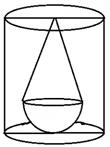
Diameter of hemisphere = 7 cm
Diameter of the base of the cone = 7 cm
Therefore, radius (r) = 3.5 cm
Height (h) = 8 cm
Volume of the solid =

Now, radius of cylindrical vessel (R) = 7 cm
Height (H) = 10 cm

Volume of water required to fill = 1540 - 192.5 = 1347.5 cm3
Two solid spheres of radii 2 cm and 4 cm are melted and recast into a cone of height 8 cm. Find the radius of the cone so formed.

A certain number of metallic cones, each of radius 2 cm and height 3 cm, are melted and recast into a solid sphere of radius 6 cm. Find the number of cones used.
Let the number of cones melted be n.
Let the radius of sphere be rs = 6 cm
Radius of cone be rc = 2 cm
And, height of the cone be h = 3 cm
Volume of sphere = n (Volume of a metallic cone)

A conical tent is to accommodate 77 persons. Each person must have 16m3 of air to breathe. Given the radius of the tent as 7m, find the height of the tent and also its curved surface area.
According to the condition in the question,
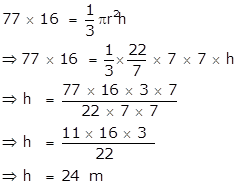
We know that,
l2 = r2 + h2
⇒ l2 = (7)2 + (24)2
⇒ l2 = 49 + 576
⇒ l2 = 625
⇒ l = 25 m
∴ Curved Surface Area = πrl = ![]() × 7× 25 = 550m2
× 7× 25 = 550m2
Therefore the height of the tent is 24m and it curved surface area is 550m2.
No comments:
Post a Comment